Joy Marie Clarkson's Blog, page 12
October 7, 2018
Decent Men in Indecent Times
All the darkness in the world cannot extinguish the light of a single candle.
— Attributed to Saint Francis of Assisa

Why do we tell so many stories about the world wars?
There are so many stories in popular culture about the World Wars. Think about it.
Dozens of books…
The Book Thief, All the Light We Cannot See, Hannah Coulter, Number the Stars, Rilla of Ingleside, The Lion, the Witch, and the Wardrobe, The Guernsey Literary and Potato Peel Pie Society, the Boy in Striped Pajamas, Number the Stars, and dozens more could be named!
Movies…
Captain America, Thin Red Line, Saving Private Ryan, Dunkirk, Hacksaw Ridge, Atonement, Schindler’s List, Valkyrie, Inglorious Basterds…The list goes on and on.
To my observation, there is at least one popular World War story every year. Last year it was Dunkirk, this year its the Guernsey Literary and Potato Peel Pie Society and Goodbye Christopher Robin. We seem to tell ourselves these stories over and over again. A few years ago, I began to ask myself “Why is that? Why do we tell ourselves this story over and over and over again? What is it about the World Wars that capture our imaginations? Why do we feel compelled as by a duty to ruminate and dwell on these stories?”
There are many ways we could answer this question, but one in particular stands out to me.

Stories about the World Wars tend to pose this question: Can people good in impossible times? Can goodness survive the gravest of evils?
These wars were both turning points in history and huge stumbling blocks to both the care free progressivism of their day and the trite theological defence of the problem of pain. The evil and darkness faced in both world wars shook the world of philosophy and theology, causing us to reckon with theodicy (the defence of God’s goodness in the face of evil) and nihilism (the idea that life has no purpose or moral impetus) in an unprecedented way. These are questions which still concerns us. The issues are different in our day, but we still face this question: can we be good in the face of evil? Can goodness survive in the face of evil?
This is the question we will explore in today’s podcast.
1. Literary - Wilfred Owen & Laurence Binyon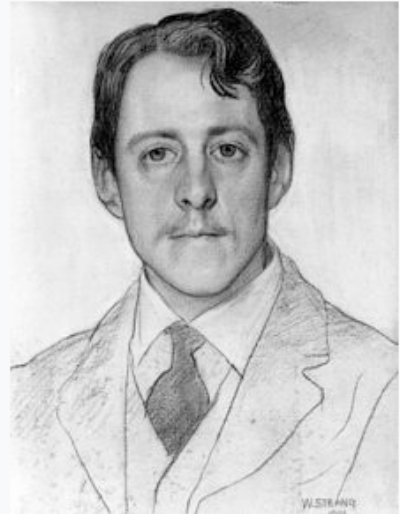
Laurence Binyon (1869-1943), Poet, Dramatist, and Scholar.

Wilfred Owen (1893-1918)
We tell the stories of the World Wars to make sense of the trauma the World Wars Inflicted.
Living in the UK, I’ve realized that WWII and even WWI are more much vivid in the cultural memory than they are the in the States. This of course makes sense because the war actually occurred on their land, civilians died, and their military losses far outweighed our own. In the first World War, nearly one million men died. That’s about in every 45 people in the United Kingdom at that point. And when you consider the fact that most of the people who died were young men, and that they made up a fairly small portion of the overall population, you realise that the first World War wiped out nearly a whole generation of young men. And even the men who did come home were often wounded, or riddled with Shell Shock (what we would call Post Traumatic Stress Disorder). Writers like Tolkien and Lewis were forever marked by their experiences in the war, both psychologically and in their day to day lives. Lewis, for his whole life, took care of the family of his best friend in war as they promised. Tolkien lost two of his best friends in the War, and saw his writing as a necessary duty in carrying on their legacy (you can learn more about that in Tolkien and the Great War. This presented a problem to contemporary artists: how did they memorialise this terrible war?
I think we tell stories about the World wars to make sense of this great evil, this great trauma.But how we make sense of that trauma matters, how we remember it makes a difference…Idealisation
Ode of Remembrance
by: Laurence Binyon
They went with songs to the battle, they were young.Straight of limb, true of eye, steady and aglow.
They were staunch to the end against odds uncounted,
They fell with their faces to the foe.
They shall grow not old, as we that are left grow old:
Age shall not weary them, nor the years condemn.
At the going down of the sun and in the morning,
We will remember them.
They mingle not with their laughing comrades again;
They sit no more at familiar tables of home;
They have no lot in our labour of the day-time;
They sleep beyond England's foam.PessimismDulce Et Decorum Estby: Wilfred Owen

Bent double, like old beggars under sacks,
Knock-kneed, coughing like hags, we cursed through sludge,
Till on the haunting flares we turned our backs,
And towards our distant rest began to trudge.
Men marched asleep. Many had lost their boots,
But limped on, blood-shod. All went lame; all blind;
Drunk with fatigue; deaf even to the hoots
Of gas-shells dropping softly behind.
Gas! GAS! Quick, boys!—An ecstasy of fumbling
Fitting the clumsy helmets just in time,
But someone still was yelling out and stumbling
And flound’ring like a man in fire or lime.—
Dim through the misty panes and thick green light,
As under a green sea, I saw him drowning.
In all my dreams before my helpless sight,
He plunges at me, guttering, choking, drowning.
If in some smothering dreams, you too could pace
Behind the wagon that we flung him in,
And watch the white eyes writhing in his face,
His hanging face, like a devil’s sick of sin;
If you could hear, at every jolt, the blood
Come gargling from the froth-corrupted lungs,
Obscene as cancer, bitter as the cud
Of vile, incurable sores on innocent tongues,—
My friend, you would not tell with such high zest
To children ardent for some desperate glory,
The old Lie: Dulce et decorum est
Pro patria mori.
I do find all this mighty hard to bear… the utter stupid waste of war, not only material but moral and spiritual, is so staggering to those who have to endure it. And always was (despite the poets) and always will be (despite the propagandsts)— not of course that it has not (been), is, and will be necessary to face in an evil world.
— - J.R.R. Tolkien in a letter to his son
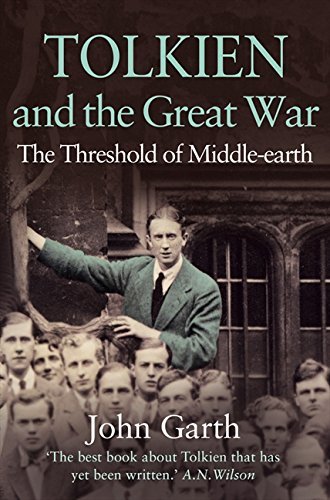
Tolkien and the Great War: The Threshold of Middle-earth
By John Garth
And this from a man whose stories are filled with war. What Tolkien understood, though, is that we should not, by trying to elevate the heroes of war, elevate war in itself. War and evil will always be a part of our experience in a fallen and broken world. What we need to is not glorify war, but instead learn how to be brave, and how to be humane within it. To defy Harvey Dent. To prepare ourselves to be decent people, even in indecent times.
2. Visual - DunkirkDirected by Christopher Nolan
We tell stories about the World Wars to help us believe that even in impossible times, good people will resist evil together.
Dunkirk is the story of the largest military evacuation in history. This movie is about bravery in the face of almost certain defeat. The reason we love it, I think, is because it represents everything good about British culture, everything we long to celebrate and emulate. Miraculously, they were not defeated, and it was because of the actions of 700 ordinary, brave men. That’s what we want to believe England is, or at least what it can be.
Dunkirk Facts:On the eve of the operation (May 26, 1940) a national day of prayer was declared with King George VI attending a special service in Westminster Abbey.338, 226 soldiers were evacuated between May 26-June 4, 1940a large number of those soldiers were evacuated by 700 “small boats” ranging from fishermen’s boats, to small yachts. It is the largest military evacuation in history

We tell the stories of the World Wars to remind ourselves that even if your whole world is evil, we must be brave and good.
Schindler’s List is based on a true story of a German national who through cunning and bribery managed to save 1,200 Jews from extermination camps. This movie is one of the most significant movies in film history. It was nominated for 12 Oscars and won 5. The music, which I will attach here, is one of the most iconic and recognisable film scores to ever be produced.
What is differentiates Schindler’s List from Dunkirk is this: Dunkirk is about many people standing against a great evil together, Schindler is about one man who is a part of the evil army, with every reason to join them, yet eventually turns against evil. It is profound because lurking in the back of our minds is the fear that if everyone else were evil, we might forget what goodness was. We might capitulate. This story reminds us that even when nothing around us is good, we must, and we can fight for truth and goodness.
I will be honest: I have not seen Schindler’s list, and I don’t think I ever can.
But I find Schindler’s story compelling because it is one which bucks against the pessimism I can sometimes find in my own heart. Always choose goodness— it does make a difference. With each brave action, we reflect what Tolkien would call the “final victory.” Goodness is never in vain.
All the darkness in the world cannot extinguish the light of a single candle.
— Saint Francis of Assisi
What does it mean for us?
Perhaps we will not face war like they did. Perhaps we will. What we do know is this: we live in a world that is broken as it was broken then. We will encounter evil in its various guises. We will encounter darkness and injustice.
What these stories can teach us is to prepare to be decent people even in indencent times. Be ready…To row your boat to save the soldiers.To use every resource you have to rescue innocent people. To resist what you know is evil.Do not quiet the voice in your heart that tells you what is wrong. Listen to it. Prepare yourself to be brave. Always.They remind us that we have the capacity to be brave, to bond with our friends in sacrificial love and bravery, and sometimes, even on our own, to resist evil to our last breath. They make us want to be a part of the resistance against evil. But to do that we must hold onto the belief that darkness will not be final, that our battle is not in vain. It makes me think of Samwise, sitting in Mordor, thinking that the likelihood is that this is where he will perish, and pursuing the course nonetheless.

“There, peeping among the cloud-wrack above a dark tor high up in the mountains, Sam saw a white star twinkle for a while. The beauty of it smote his heart, as he looked up out of the forsaken land, and hope returned to him. For like a shaft, clear and cold, the thought pierced him that in the end the Shadow was only a small and passing thing: there was light and high beauty for ever beyond its reach.”
Return of the King
September 23, 2018
The Wisdom of Whimsy

Gathering Autumn Joys by Breezy Brookshire
Whatever is true, noble, right, pure, lovely, whatever is admirable... think about such things
— Philippians 4:8
“I don't deny,' he said, `that there should be priests to remind men that they will one day die. I only say that at certain strange epochs it is necessary to have another kind of priests, called poets, actually to remind men that they are not dead yet.”
It is a heavy, difficult world. What wisdom is there in taking things lightly?- G.K. Chesterton, Manalive.
Once, in college, I worked on a magazine staff. I wanted to do a story on Beatrix Potter, the children's book illustrator and self-made millionaire whose work I had always enjoyed and admired. The response of my colleague came as a surprise...
Her work is cute, whimsical, not worth anything. it has nothing to do with the real, hard world.
I was gobsmacked. Aside from being a rather vitriolic response to a request to write a three paragraph essay on a children's book writer, it stirred up an annoyance and a curiosity in me... was he right? Is whimsical art worth it? Must all art, as Jeremy Begbie once wrote, contain the Triduum (the death of Good Friday, the silence of Holy Saturday, and the resurrection of Easter) to be truly useful or Christian? Is whimsical art good? Useful? Neutral? Is it bad art? Bad for us?
Whimsy helps us recognize the intrinsic goodness of life, which energizes us to protect that goodness.Let’s look at the work and life of three artists who passionately exhibited this whimsical love of life.

Literary - G.K. Chesterton, Manalive

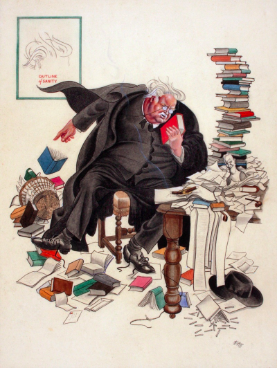
Oswald Charles Barrett.
Gilbert Keith Chesterton (1874-1936) was a journalist, writer, poet, dramatist, and "Prince of Paradox." Chesterton was born to a loving, creative, and agnostic family. At the Slade School of Art, Chesterton suffered something like a mental breakdown, in which he admitted to becoming morbid and nearly suicidal. Emerging from that slump, he began a search for truth, for reality. He credited his life-long love and wife, Francis, for bringing him to faith. Whatever the circumstances of his conversion, Chesterton's faith was characterised by a profound hilarity.
Fun fact: He was an ENORMOUS person, standing at around 6'4 and weighing nearly 300 pounds. His larger than life persona matched his larger than life body.
Chesterton thought that one of our greatest problems is that we take the wondrousness of life for granted, and that we give in to cynicism.“Because children have abounding vitality, because they are in spirit fierce and free, therefore they want things repeated and unchanged. They always say, "Do it again"; and the grown-up person does it again until he is nearly dead. For grown-up people are not strong enough to exult in monotony. But perhaps God is strong enough to exult in monotony. It is possible that God says every morning, "Do it again" to the sun; and every evening, "Do it again" to the moon. It may not be automatic necessity that makes all daisies alike; it may be that God makes every daisy separately, but has never got tired of making them. It may be that He has the eternal appetite of infancy; for we have sinned and grown old, and our Father is younger than we.”
- G.K. Chesterton, Orthodoxy
What Chesterton is advocating here is not a fluffed up version of reality, seen through rose colored glasses, but an appreciation of the strange givenness of reality.
Fairy tales say that apples were golden only to refresh the forgotten moment when we found that they were green. They make rivers run with wine only to make us remember, for one wild moment, that they run with water.
— G.K. Chesterton, Orthoxy
Regarding this idea, my friend Boze wrote me saying: I've been re-reading the introduction to The Annotated Alice, where he talks about Carroll's effect on Chesterton and how, seen from one way, the world is a nightmare, and seen from another way, the world is a miracle. and how nonsense literature captures the strangeness of the world like nothing else does... I've been revisiting the stories of Ray Bradbury and realizing just how much that man shaped my worldview. he was in love with the humanities and books and art and fantasy and Hallowe'en and believed they had real power to transform the world for the better, and that the modern world was suffering from a suffocating lack of fantasy and imagination. there was a line that when I read it in one of his short stories reminded me of you - the hero of this story built a giant mansion on Mars and filled it with mechanical replicas of characters from books that had been banned on earth. and when someone asked him why he was going through all the trouble he said, "It was enough just to be able to create this place. To be able to say I did it. To say I nurtured a medieval atmosphere in a modern, incredulous world." isn't that just perfect? "
Whimsy turns the world upside down so we can love and cherish it when it is turned right side up. It helps us cherish what is good.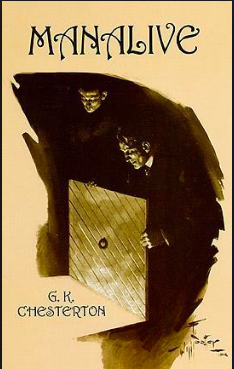
Chesterton puts his philosophy to work in his strange, delightful and ridiculous book Manalive.
This book is about Innocent Smith, a strange man who floats into a London parlour like Marry Poppins. His arrival, his strange sayings, and his games precipitate romances, delights, reforms, and reconciliations. But, suddenly, a startling revelation comes about: Innocent is a thief, and adulterer, and a murderer. Can it be true?
What comes to light is that Innocent stole his own things that he might come to value you them, he had affairs with his own life, he put a gun to someone's head that they might not want to die.
Innocent turns the world upside down so that, right side up, he can accept it all as a strange, wondrous gift from God.
“His principle can be quite simply stated: he refuses to die while he is still alive. He seeks to remind himself, by every electric shock to the intellect, that he is still a man alive, walking on two legs about the world. For this reason he fires bullets at his best friends; for this reason he arranges ladders and collapsible chimneys to steal his own property; for this reason he goes plodding around a whole planet to get back to his own home; and for this reason he has been in the habit of taking the woman whom he loved with a permanent loyalty, and leaving her about (so to speak) at schools, boarding-houses, and places of business, so that he might recover her again and again with a raid and a romantic elopement. He seriously sought by a perpetual recapture of his bride to keep alive the sense of her perpetual value, and the perils that should be run for her sake.”
- G.K. Chesterton, Manalive
A free version of "Manalive"
whimsy helped chesterton know the true value of the ordinary things. this emboldened him to be a bold defender of what was good in the world.
Chesterton was known to be something of a radical politically. I think his whimsy, his love of the wondrousness of the world is what shaped his radical opinions.
I begin with a little girl’s hair. That I know is a good thing at any rate. Whatever else is evil, the pride of a good mother in the beauty of her daughter is good. It is one of those adamantine tendernesses which are the touchstones of every age and race. If other things are against it, other things must go down. If landlords and laws and sciences are against it, landlords and laws and sciences must go down. With the red hair of one she-urchin in the gutter I will set fire to all modern civilization.
Because a girl should have long hair, she should have clean hair; because she should have clean hair, she should not have an unclean home; because she should not have an unclean home, she should have a free and leisured mother; because she should have a free mother, she should not have an usurious landlord; because there should not be an usurious landlord, there should be a redistribution of property; because there should be a redistribution of property, there shall be a revolution.
That little urchin with the gold-red hair, whom I have just watched toddling past my house, she shall not be lopped and lamed and altered; her hair shall not be cut short like a convict’s; no, all the kingdoms of the earth shall be hacked about and mutilated to suit her. She is the human and sacred image; all around her the social fabric shall sway and split and fall; the pillars of society shall be shaken, and the roofs of ages come rushing down, and not one hair of her head shall be harmed.
— What’s Wrong with the World (1910).
For listeners interested in further reading, read this essay called “in defence of nonsense.” Visual - Beatrix Potter
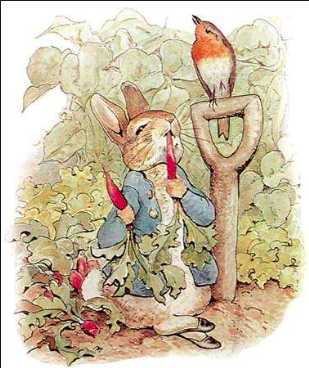
Peter Rabbit himself!
Beatrix Potter (1866-1943) was a woman whose love of the ordinary, odd, and whimsical lead to her fierce defence of them.
She was raised in isolation by a wealthy family. Not having many friends, she spent her days drawing and painting the flora, fauna, and wildlife in the beautiful places she lived. To the shock of everyone in her life, her self published "bunny book," The Tale of Peter Rabbit (1902) became a swift best seller, selling 56,470 books in the first year. She had a keen business mind, and managed her funds very well. She continued to publish her books and save her money. She eventually bought Hill Top Farm, in the Lake District of England, to escape her fraught relationship with her mother.
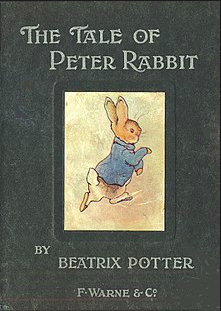
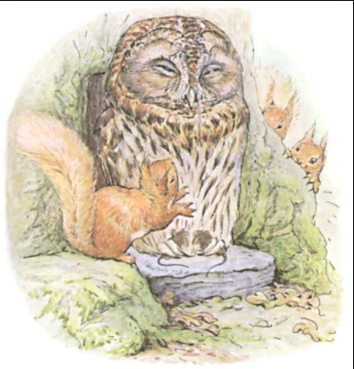
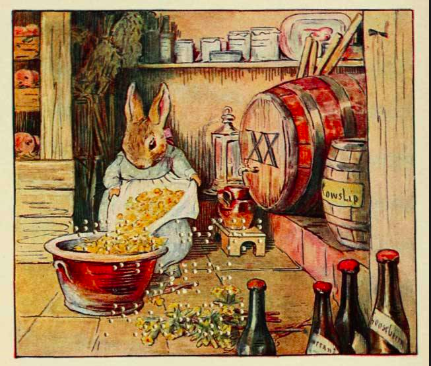

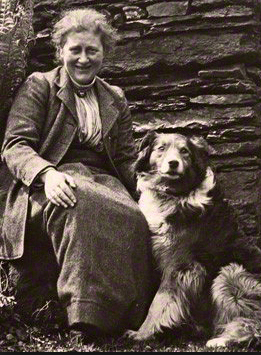
Perhaps her greatest accomplishment of all was her preservation of large tracts of the Lake District.
Having an enormous amount of money, and being an industrious woman, Beatrix began to look for productive ways to spend her money. The industrial revolution had already spent years spewing black smoke onto the land she loved, so preservation came to mind. She became the disciple of Hardwicke Rawnsley, an Anglican priest, poet, hymn writer, and preservationist. He encouraged her to use her funds to preserve the Lake District from industrial development. By the time of her death, she had purchased 4,000 acres of land and 14 farms, which she gave to the National trust. Those farms still exist today.
You can find out more about her work with the preservation trust here.

I visited with my dear friend elena... the views will take your breath away.

Here we are at Hill Top... Beatrix's home! I wish I could ask Beatrix about her artistry... did her whimsy inspire her preservation?I can't interview Beatrix, but I can interview someone whose art reminds me of hers.... Breezy Brookshire

Breezy is an illustrator and I'm waiting for her first NYT bestseller.
Her art displays all the aspects of whimsy a soul could desire... attention to detail, playfulness, humor, loveliness. I interview her about her artistry, her whimsy, and what role it plays in her life...
Talk to me about your artistry... When I go to paint something, I almost always have a very clear idea of what it’s going to be and I just have to make it. Before I get to painting, I’ll start with a couple pencil sketches to be sure I know what I’m going to do and can feel what kinds of colors I’ll want to use. I usually sketch the people’s expressions only once so I don’t lose the energy of what I first imagined.
I love using watercolor because it forces you to think and move quickly. It keeps me on my toes which adds to the fun of it, and watercolor shouldn’t be overworked anyway. Once I get started I like to clip along and can’t wait to see how it ends.
What inspires you? So much of my art is inspired by this kind of dream world in my mind, made up of the towns and landscapes that I’d see in children’s books growing up. It’s a mix of Avonlea, The Hundred Acre Wood, and The Jolly Postman’s fairy tale village. I’ve always loved the feeling I’ve gotten from them, and want to give that same feeling to others.
With this particular piece (The Book Tree), my inspiration was the hours upon hours of my childhood spent in children’s books, going on walks through my Granny’s woods or hunting for tadpoles, and the weekly highlight of taking home a giant stack of books home from the library.
What do you think the value of beauty and whimsy is in a difficult world? Beauty reminds me that there’s something greater beyond what’s right in front of me. Beauty and whimsy lighten our hearts and help us to dream.
It could be anything—a painting of a sunlit cottage, a ballad about a knight fighting a dragon, a postcard with a whimsical bird on it—it reminds me that my current situation isn’t the end of my story or the point of my existence, that God still has good for me. It tells me that the universe is a dance designed by a loving God. We become jaded easily and need to know that even when things seem dark and endlessly difficult, there is still joy to be had.

Here is the piece she mentioned!
Friends, you really must go peruse, buy, and support Breezy's art.
Find her on Instagram (my favourite!).Find her on her website.And find her on Etsy.3. Musical - Regina Spektor
Regina Spektor was the first artist I called my own. Up till I found Regina, I rode on the coattails of my siblings' taste in music. When I discovered Regina, I had knew I had found a kindred spirit. Her music was playful, intricate, sometimes frightening, sometimes deep, sometimes nonsensical. My internal monologue is somewhere along those very divergent lines, and so she resonates with me. And I just enjoy her style! But I think the thing I like best is this...
her music manages to hold the heaviness and the lightness of life together.she treats things lightly so we can understand their gravity.this song is a great example of this...
This song is whimsical if it is anything. Nonsense words, lines strung together by nothing but rhymes, and all prefaced by the instructional words "This is how it works." Just like Chesterton, Regina uses whimsy to remind us that life is much like a fairy tale in that the rules of life can seem arbitrary (like the rhyming first verse), yet in the midst of the apparent absurdity, there seems to be so much goodness, meaning, and love.
Regina uses whimsy to remind us of the goodness and strangeness of life.So, what do you think?
Is whimsy wise?
Can whimsical art be good art? Can it capture aspects of reality?
Can whimsical art be good for us?
An Exciting Announcement…Speaking with Joy is now a featured podcast for the Anselm Society.
The Anselm Society wants to see an renaissance of the Christian Imagination in the church.
It’s a nonprofit organization, based in Colorado Springs. They have two main goals:
Conversation. We publish written resources, host podcasts, organize events(notably the Your Imagination Redeemed conference), and bring together thought leaders to inspire and educate pastors, artists, and the laity to better work together to form the Christian imagination.
Incarnation. We want to do more than tell people something. We want to be an incarnation of a different way of doing things; in fact, most of the good God has done through us has grown organically out of exactly that. So our growing core community in Colorado Springs frequently hosts community events (concerts, discussion groups, pub nights, etc.); we also continue to work with member churches, and we run a thriving Arts Guild whose members support each other and enrich the life of local congregations.
In my time in Colorado, I’ve had the pleasure of being involved with their ministry, and I gained a lot from the events and conversations they cultivated.
Check out their website, the other podcasts, and all the written resources they have!
I’m pleased as punch to be an Anselm Partner! Make sure to check out their work.September 9, 2018
Heroes and Antiheroes with Nathan Clarkson

This week on the podcast I chatted with my brother Nathan...

Nathan is an actor, author, and artist.All that imaginative pretending we did as a kid paid off. Nathan writes and performs in movies, like "Confessions of a Prodigal Son," which is available on Netflix. He also co-authored a memoir about his childhood struggles with OCD, ADHD, MDD, and dyslexia. At the links below you can find some of his work...
Nathan's Instagram
Nathan's Facebook
Nathan's Website
Nathan also wrote a book with my mom about what it was like growing up with Dyslexia, ADD, OCD, Major Depressive Disorder and Anxiety.
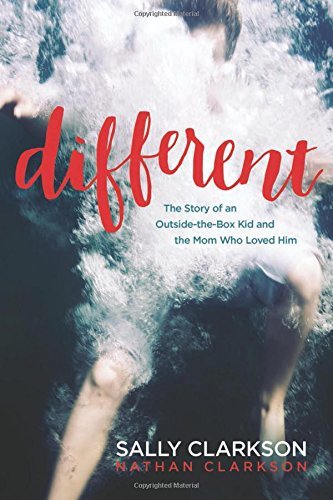
Different: The Story of an Outside-The-Box Kid and the Mom Who Loved Him
By Sally Clarkson, Nathan Clarkson

Why does our culture celebrate anti-heroes? Villainous protaganists? This week Nathan and I discuss the prominence of anti-heroes in film and television.
We've both noticed that over the last ten years, there's been a distinct uptick in anti-heroic protagonists—main characters who aren't heroic, and sometimes aren't even good. Think about it...

Katniss Everdeen: a flawed, and ultimately, failing hero, who capitulates to the evil she fights.

Walter White: a character whose mixed motives always leave us wondering... is it worth it?
.
.
.
.

The Joker: An unabashedly evil character who, for some reason, many people found more compelling than the hero, Batman.
Do we believe in Heroes anymore?

A long time ago, I wrote about why we tend to think of good characters as boring. Part of our problem is that we have given into cynicism; we simply don't think there truly are good characters. Once a friend said to me "No one could be as good as Aragorn." But there's a problem with that...
We cannot become what we cannot imagine. If we can’t imagine heroes in our movies, books, and television series, we won’t know how to be heroes in our own lives.
We need to rethink what it means to have strong, compelling, heroic characters.

Another issue is that we think of goodness in terms of not-badness.
A shift, I think should take place. We need to stop thinking of goodness, and instead, think of evil as a perversion of good. Goodness is virtue, strength, perfection. Evil is an imitation, and a bad one at that. As Nathan says: darkness is not something, it is the absence of light. So too is badness only a corruption of goodness.
as to the accusation that good characters are uncomplicated... what could be more complicated than being good in a bad world?
Another thing we didn't talk about in this podcast but is still important...
I think we also forget that, often, heroes (particularly super heroes) are meant to represent an ideal. They're not really meant to be normal people. So when we reject the heroes what we're really rejecting is the ideal. We should be more honest with ourselves: is it the ideal we distrust? or has our cynicism just gotten a hold of us?
So tell me... what do you think?Are there still heroes out there?If you enjoyed this podcast, consider supporting me on Patreon.
Patreon lets you support me while you get more out of the podcast.
If you're interested in getting a little more out of the podcast and supporting me as I create podcasts+do my Phd, consider joining my Patreon. It's $10 a month and includes extra content (secret podcasts, monthly newsletters), a discussion board, and a book of essays.
As an example: this week's podcast on emotion will be supplemented by a podcast I did with a friend on lament in the Old Testament. If you want access to the supplementary podcasts, check out the Patreon! You can always cancel after the first month if you decide it's not for you.
I can't express the extent of my gratitude for your support.Your support this month helped me:
- cover moving expenses
- buy train tickets between Oxford and St Andrews so I am able to complete this fellowship.
- buy the occasional coffee while studying (I call it "graduate tax" as it really is a necessity while studying).
If you're interested, please check out this link.
August 27, 2018
The Army of Emotions



from... https://www.huffingtonpost.com/domini...
What are we to do with the emotions?
Our world is overrun with emotions. We live in a time of public outrage. Behind the transluscent wall of the internet, a vigilant hoard of self-appointed score keepers await the smallest gaff and the greatest injustice to unleash a wave of hate, disgust, anger, and indignation. And are they wrong? There is much to be indignant about in our world.
When not expressed, it seems that emotion lies suppressed and oppressing under the fearsome hand of depression, after all, as TIME recently reported..
Depressions has risen by 33% since 2013. We are awash with emotions.But we are drowning in them.What should we do?
Bury them?
Give into them?
Ignore them?
Act in spite of them?
The emotions are profoundly important.In no small part simply because we cannot escape them. To be human is feel— to love, to hate, to want. It seems there is no escaping them, so we may as well figure out what to do with them. Today we'll explore this question through the lens of Mr. Rogers, Saint Macrina the Teacher, and The Song of the Sea.
1. LiterarySaint Macrina - The TeacherWhen directed by wisdom, the emotions are our allies in virtue.

Saint Macrina (AD 324-379) was born as the eldest daughter of a Holy Family in Cappodocia shortly after the Diocletian Persecution (303-313), the most devastating persecutions in the early church. She is descended from a family of Saints, and her grandfather was a martyr. Perhaps most famously, she was the older sister of two of the Cappodocian Fathers (Gregory of Nyssa and Basil the Great). They were famous for formulating the orthodox formulation of the Trinity which we use today.
Macrina's brother, Gregory of Nyssa, called her "The Teacher."Consider this passage from Kevin Corrigan's book The Life of Saint Macrina. :
Macrina was born in 327, then Basil in 329, then Naucratius, followed by Gregory in 331 or later, down to Peter, the youngest child, in 341. Their father died in 340, and there is no doubt from Gregory's account that Macrina, though only twelve years old, was the major pillar of strength for the family at this time. Although Basil himself does not speak of her, Gregory, only four years her junior, calls her his teacher (didaskalos) and tells us that when Peter was born, Macrina personally took his education in hand and became everything for the child: "father, teacher, guide, mother". Her strength of resolve and religious devotion had, in fact, been demonstrated even before the death of her father, after the unexpected death of her fiancé; for against her parents' wishes, something unique in early accounts of saints' lives,[5] she determined to remain unmarried, and never to separate herself from her mother, but to live a life of asceticism. At a very early age, then, she recited the psalms at appropriate times during the day and was not only skilled in the genteel task of spinning, but also insisted upon performing the servile one of preparing bread for her mother "with her own hands". This is the girl who grows up as the partner to her mother's worries, persuades her mother to turn the family home into a monastery, to hold all possessions "in common" and to treat her maids as "sisters and equals instead of slaves and servants", who with her mother founds the convent at Annisa by the Iris (probably in 352) and who gives all her possessions away when her mother dies in 370. And this too is the girl who, according to Gregory's testimony, takes Basil in hand when he comes home from university "monstrously conceited about his skill in rhetoric, contemptuous of every high reputation and exalted beyond the leading lights of the province by his self-importance", ultimately to win him to "the ideal of philosophy".
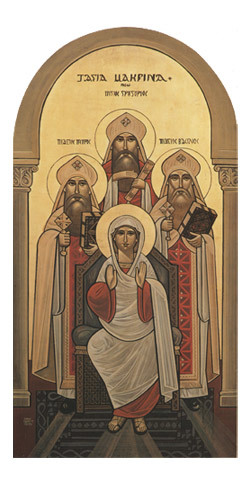
- Kevin Corrigan, The Life of Saint Macrina
Saint Macrina was a big deal.Not only did she educate one of the most influential church fathers in the Christian tradition, she also seems to have set the course of Christian monasticism in the East. She is to be taken very seriously.
I love this icon of her, enthroned and surrounded by her disciples.
Macrina and the Emotions:Lucky for us, one of the main topics Macrina address was the emotions. We have no direct writing from her, but On the Soul and Resurrection, Gregory of Nyssa records a long conversation that he has with Macrina on her deathbed. The dialogue is an homage to Plato's Phaedrus, in which Socrates comforts his student, preparing him for his ultimate death by affirming to him the eternality of the soul. Macrina does a similar thing for Gregory, instead emphasising the assurance of the resurrection given by Jesus.
the dialogue presents macrina as socrates, and Gregory as the student.So, yeah. As I mentioned, Macrina was kinda a big deal. Lucky for us, one of the topics they discuss most is the emotions. And particularly how to manage the fear of death. This is pretty much what she comes down to ...

1. We have emotions because we have bodies.
I love that idea!“Whatever faculties are proper to the irrational nature are mixed with the intellectual power of our souls. From the animals… is anger, from them is fear, from them all the other qualities … except thinking power, which indeed alone is distinctive of our nature, have (as we have said), in itself the imitation of the divine character.”- On the Soul and the Resurrection
Macrina argues that because have bodies, and bodies are always needing things (food, sleep, shelter, sex, etc.), we are constantly pulled about by desire, and that emotions emerge from those needs.
SIDE NOTE:I think it's interesting how consonant this is with our contemporary scientific and psychological understanding of emotions.However, this is not to denigrate the emotions, or the body. Macrina holds that all of creation, including these bodies of ours, flow out of God's lifegiving, loving nature. So, our bodies themselves are signs of God's love. But it's not just that! The emotions have an even deeper meaning...
2. emotions draw us toward GodMacrina believes that our emotions remind us that we are needy creatures, and that ultimately we need God. Being the little needing, eating, wanting, and emoting creatures we are, we are constantly aware of our lack. That lack, Macrina says, is meant to draw us close to God. Every time we desire and are satisfied, be it by food or company, we are reminded that God made us and our souls and bodies find rest in his generous love.
“It would seem that Our Lord finds our desires not too strong, but too weak. We are half-hearted creatures, fooling about with drink and sex and ambition when infinite joy is offered us, like an ignorant child who wants to go on making mud pies in a slum because he cannot imagine what is meant by the offer of a holiday at the sea. We are far too easily pleased.”- C.S. Lewis, The Weight of Glory.We should not hate our emotions and our desires, but see them as invitations to move deeper into God's satisfying love.
3. the emotions help us be virtuousIn the dialogue, Gregory observes the following...
We see that virtuous people receive no little assistance toward the good from these faculties (passions). For Daniel’s desire was praiseworthy, and Phineas placated God by his anger. We have learned that the beginning of wisdom is fear, and we have heard from Paul that the end of godly grief is salvation.- On the Soul and the Resurrection.What Gregory seems to be saying is that everything worth accomplishing, every holy deed, is done through the emotions. He is doing away with the idea of disinterest as the highest form of holiness. The ideal is not to disinterestedly do good, but to have your emotions aligned in such a way that they become the powerful force that helps you to do good. Macrina recognizes that, in many ways, the emotions are a more powerful force than the intellet. Therefore, they must be trained and directed for the purpose of virtue. As C.S. Lewis would put it, we must "Inculcate just sentiments." A big part of our cultivation as people is learning to train and direct our emotions. Macrina uses an metaphor to describe this: the army of emotions.
The army of emotions...If a person uses these emotions according to the right principle, receiving them in himself without falling into their power, he will be like some king who, by using the many hands of his servants for assistance, will easily accomplish his virtuous purpose.- On the Soul and Resurrection.Like an army, if the emotions are trained, they can accomplish great tasks. But if they lack direction and they lack discipline, they will war within themselves, and destroy their own kingdom.
I think Macrina presents us with a compelling solution to the problem of emotions. She helps us understand that emotions are good— they are a reminder that we are needy creatures, and that our need is only completely met in God. They draw us toward God as we are constantly aware of our need for him. And finally, when they are trained and directed, they can become the conduit toward great growth and acts of heroism. Song of the Sea
2. MusicalMr. Rogers your feelings matter deeply, but they need not control you
Mr. Rogers spent most of his life promoting this message:
Children's emotional lives matter.He spent years on his show trying to depict the world and mind of children, honoring it, and trying to help children grow in health and character. And important aspect of this work was to help children master their emotions. Mr. Rogers did a great deal of research into childhood development to consider how to help children learn to identify their feelings and deal with them in a healthy way. He then tried to use his show as an educational tool. This song is a good example...
Message behind this song:- Your feelings are legitimate- Suppressing emotions will not do away with them.- You have the ability, agency, and will to overcome them Pretty deep stuff for a kid's show...pssst! You've all gotta go watch "Won't You Be My Neighbor." I cried. It's truly amazing and inspiring.3. VisualThe Song of the SeaIf we attempt to suppress or bury our emotions, they will bury us

The song of the sea is about Sorrow.
This movie is made up of two stories—one mythical, and one ordinary. Or perhaps it would be better to say that it is one story with two threads that weave all the characters together.

The core of the stories is based around an Irish myth. Macha, also known as the owl witch, is the mother of a giant called Mac Lir. Mac Lir experiences a great sorrow, and fills up the whole sea with his tears. Deeply upset by her son's suffering, she takes drastic measures: she turns him into stone. At least then, he will no longer weep.
She becomes obssessed with controlling emotions. She turns nearly all the fairy folk into stone, and begins to bottle all hers up in little jars. As she does this, she too slowly turns into stone.

This story obviously relates to the ordinary world (though, could anything truly be called ordinary in this wondrous movie?) we are presented with in the main plot. A young father mourns the loss— and what appears to be the abandonment— of his wife, and the mother of his two children. His assertive Irish mother comes to put things in order, and attempts to drag him out of his misery. She insists that the children would be better off with her in Dublin. She takes them.
Like Macha, she hates to see her son suffer. Like macha, she'd rather he was hardened than broken.
Saoirse and Ben do not take well to Dublin, and they go on an adventure home. As they go, they meet many of the fair folk... and Macha herself!
They must convince Macha to feel her emotions or else the whole fairy world will be turned to stone.
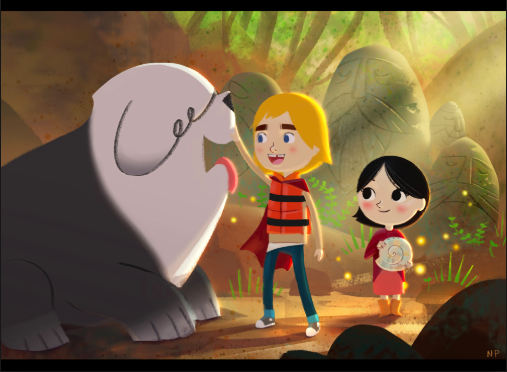


Song of the Sea show us that burrying our emotions is not an option.
If we bury sorrow, anger, grief, it will turn us to stone.We must learn to experience emotion, accepting it as a part of being human.
We must let it wash over us like an ocean wave.
I hope you enjoyed this episode!If you want to dive deeper into the topic of emotion, sorrow, and the healthy ways we express it, you should join my Patreon where there is a supplementary podcast on Lament in the Hebrew Bible. I did this podcast with my dear friend Macie Lynne Sweet, who is currently a Masters Student at Princetone Theological Seminary. She did a play on the theme of lament in the Old Testament. It is beautiful and moving and helpful. And if you support my Patreon you can hear it!

It will be out later this week. Please let me know your thoughts and questions, and most of all, I'd love to know...How do you manage your army of emotions?
See you all next time for Heroes and Antiheroes, a special episode with my brother Nathan.
peace,
oy
July 30, 2018
Reading with Joy - Finale and Great Divorce Reading List!

My main takeaways from Great Divorce...1. Desire is good.desire is good because it draws us out of ourselves toward beauty, others, the world, and ultimately toward God.
If there lurks in most modern minds the notion that to desire our own good and earnestly to hope for the enjoyment of it is a bad thing, I submit that this notion has crept in from Kant and the Stoics and is no part of the Christian faith. Indeed, if we consider the unblushing promises of reward and the staggering nature of the rewards promised in the Gospels, it would seem that Our Lord finds our desires, not too strong, but too weak. We are half-hearted creatures, fooling about with drink and sex and ambition when infinite joy is offered us, like an ignorant child who wants to go on making mud pies in a slum because he cannot imagine what is meant by the offer of a holiday at the sea. We are far too easily pleased.
- C.S. Lewis, Weight of Glory
2. Choices matter.They matter because they are making something of us.
“That thing is Freedom: the gift whereby ye most resemble your Maker and are yourselves part of eternal reality.”
- C.S. Lewis, The Great Divorce
"The whole difficulty of understanding Hell is that the thing to be understood is so nearly Nothing. But ye'll have had experiences . . . it begins with a grumbling mood, and yourself still distinct from it: perhaps criticising it. And yourself, in a dark hour, may will that mood, embrace it. Ye can repent and come out of it again. But there may come a day when you can do that no longer. Then there will be no you left to criticise the mood, nor even to enjoy it, but just the grumble itself going on forever like a machine. But come! Ye are here to watch and listen. Lean on my arm and we will go for a little walk."
- C.S. Lewis, The Great Divorce
3. Everyone can be redeemed.and everyone is significant!It is a serious thing to live in a society of possible gods and goddesses, to remember that the dullest and most uninteresting person you talk to may one day be a creature which, if you saw it now, you would be strongly tempted to worship, or else a horror and a corruption such as you now meet, if at all, only in a nightmare. All day long we are, in some degree, helping each other to one or other of these destinations. It is in the light of these overwhelming possibilities, it is with the awe and the circumspection proper to them, that we should conduct all our dealings with one another, all friendships, all loves, all play, all politics. There are no ordinary people. You have never talked to a mere mortal.- C.S. Lewis, Weight of Glory
Great Divorce Book List!1. The Marriage of Heaven and Hell by William Blake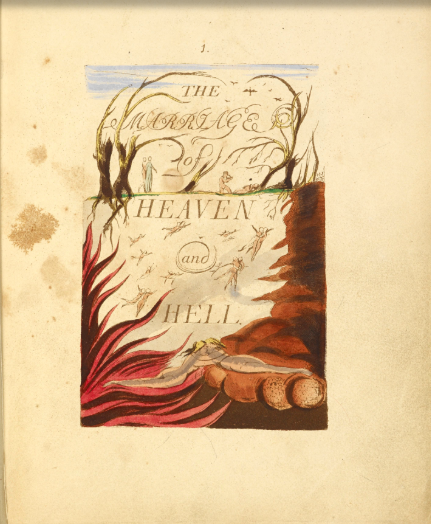
The Great Divorce gets its title as a play off of Blake's strange and wonderful masterpiece. Originally composed as a mixture of etchings and prose, the pictures (strange and terrible!) are as important to the book as the words themselves. Blake's message is that human nature is made to desire, and that the chief sin is to restrain that desire.
You can find the scan of the original printing here.
And you can find an easier to read version of the prose here.
Feel confused at the end?
No worries. You're in good company...
Blake wrote the Marriage of Heaven and Hell. If I have written of their Divorce, this is not because I think myself a fit antagonist for so great a genious, nor even because I feel at all sure that I know what he meant.
- C.S. Lewis, The Great Divorce, Introduction.2. Lilith by George MacDonald (actually... anything by MacDonald!)
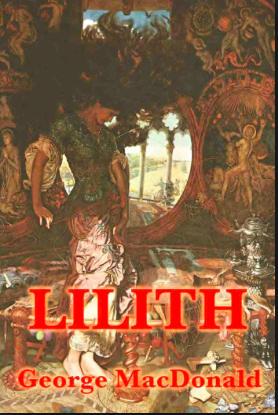
So, I really shouldn't tell you to start with Lilith as it is by far the strangest and most difficult of MacDonald's work, but what I love about it is it's emphasis on the question "Can anyone be redeemed." Lilith, the vampiric second wife of Adam in Hebrew folklore, represents the image of an unredeemable person. But as the story goes on, the reader begins to wonder: can even the most evil of creature's be redeemed? The book asks all the most important questions about choice, free will, human nature, suffering, and hope.
You can find an ebook of Lilith here.
But, before you read lilith, read anything by macdonald...Phantastes (the book that Lewis describes as having "baptized my imagination."
3. Confessions by Saint Augustine of Hippo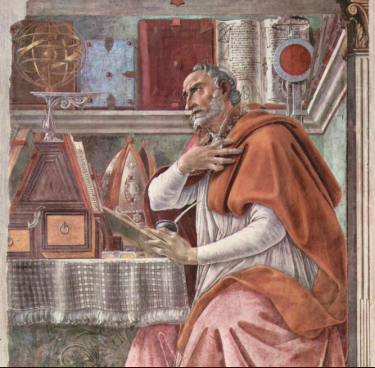
As I hope I showed in the podcast, Lewis lifts some of Augustine's central themes, and even some central themes straight out of Confessions. There is no one more influential when it comes to a theology of desire.
You can find an online copy of Confessions here.
4. Paradise Lost by John Milton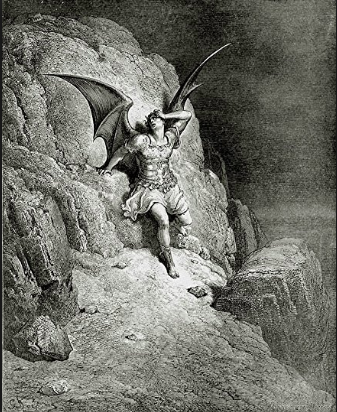
In one of the greatest poetic works of all time, John Milton attempts to "Justify the ways of God to men," by retelling the creation and fall of mankind. Of course, our good friend Blake accuses Milton of "being of the devil's party" because he makes the devil such a compelling character. Still, you will have to read to decide for yourself.
fun fact: lewis wrote a rather lengthy preface to Paradise Lost.You can find Lewis' preface to Paradise Lost here.
You can find John Milton's Paradise Lost here.
5. Weight of Glory by C.S. Lewis (and other various titles!)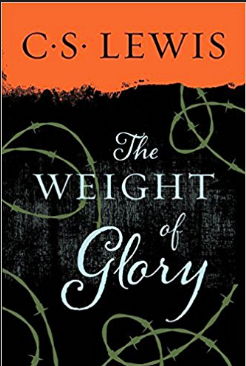
Given as a sermon at the St Marys University church in Oxford, this sermon perhaps more than anything captures the heart of what Lewis tries to portray in the Great Divorce. It is a quick and easy read and a profoundly affecting one.
You can find the Weight of Glory here.
I think Lewis' spiritual autobiography depicts his own movement from ghost to Spirit (or at least the hardening of his feet!). He also talks about the concept of Joy (as desire) a lot, and as you read it, some of the themes in Great Divorce will come into greater clarity.
You can find Surprised by Joy here.
Well, friends. What a delight it has been to read with you.I can't believe that in the midst of a busy summer so many of you (about 800!) have stuck with me! I've so enjoyed hearing your thoughts and insights. And am a bit sad to be done! But I look forward to coming out with my new season of Speaking with Joy beginning August 27th. Keep your eyes out for announcements.
But until then...
Tell me: what was your biggest takeaway from the Great Divorce?July 23, 2018
Out of love I will not go

Out of love I will not go...
Every young man or boy that met her became her son-even if it was only the boy that brought the meat to her back door. Every girl that met her was her daughter. Her motherhood was of a different kind. Those on whom it fell went back to their natural parents loving them more. Few men looked on her without becoming, in a certain fashion, her lovers. But it was the kind of love that made them not less true, but truer, to their own wives. Every beast and bird that came near her had its place in her love. In her they became themselves.
And now the abundance of life she has in Christ from the Father flows over into them.
— C.S. Lewis, The Great Divorce, Chapter 12
Chapter 11:Greatness in Heaven.
Lewis loves to go out of his way to surprise us. We are surprised by the mother's whose love becomes a stumbling block to her salvation. The man whose lust, transformed into sanctified desire, becomes the horst that pulls him into heaven. And here, in this chapter we meet "One of the Great Ones." We expect to meet a great saint, or perhaps even, as the narrator indicates ("Is it... is it?") the Mary. But no. It is Sarah Smith. A person with the most ordinary of names. A person whose name you wouldn't remember. What makes her great?
It is Sarah Smith's love that makes her great. Her love exalts her.The greatest among you will be your servant. For those who exalt themselves will be humbled, and those who humble themselves will be exalted.- Matthew 23: 11-12This scene is, again, inspired by Augustine's Confessions. Just as with the Lustful Lizard, which mimics Augustine's own temptations, we see another vision of romantic love redeemed. Compare these two passages:
I had turned my eyes elsewhere, and while I stood trembling at the barrier, on the other side I could see the chaste beauty of Continence in all her serene, unsullied joy, as she modestly beckoned me to cross over and hesitate no more. She stretched out loving hands to welcome and embrace me, holding up a host of good examples to my sight. With her were countless boys and girls, great numbers of the young and people of all ages, staid widows and women still virgins in old age. And in their midst was continence herself, not barren but a fruitful mother of children, of joys born of you, O Lord, her Spouse.
- Augustine, Confessions, Book VIII.
And...
First came bright Spirits, not the Spirits of men, who danced and scattered flowers-soundlessly falling, lightly drifting flowers, though by the standards of the ghost-world each petal would have weighed a hundred-weight and their fall would have been like the crashing of boulders. Then, on the left and right, at each side of the forest avenue, came youthful shapes, boys upon one hand, and girls upon the other. If I could remember their singing and write down the notes, no man who read that score would ever grow sick or old. Between them went musicians: and after these a lady in whose honour all this was being done. I cannot now remember whether she was naked or clothed. If she were naked, then it must have been the almost visible penumbra of her courtesy and joy which produces in my memory the illusion of a great and shining train that followed her across the happy grass. If she were clothed, then the illusion of nakedness is doubtless due to the clarity with which her inmost spirit shone through the clothes. For clothes in that country are not a disguise: the spiritual body lives along each thread and turns them into living organs. A robe or a crown is there as much one of the wearer's features as a lip or an eye. But I have forgotten. And only partly do I remember the unbearable beauty of her face.
- C.S. Lewis, Great Divorce, Chapter 12.Like with the lustful lizard man, we see the glorious vision of Sarah's earthly love baptized and resurrected. Will it be enough to win the Tragedian?The greatest love is a gift.
In The Four Loves, Lewis describes two kinds of love: Need Love and Gift Love. He defines need love like this...
My Greek Lexicon defines storge as “affection, especially of parents to offspring”; but also of offspring to parents.. The image we must start with is that of a mother nursing a baby, a bitch or a cat with a basketful of puppies or kittens; all in a squeaking, nuzzling heap together; purrings… Affection is responsible for nine-tenths of whatever solid and durable happiness there is in our natural lives
The Need and Need-love of the young is obvious; so is the Gift-love of the mother. She gives birth, gives suck, gives protection. On the other hand, she must give birth or die. She must give suck or suffer. That way, her Affection too is a Need-love. There is the paradox. It is a Need-love but what it needs is to give. It is a Gift-love but it needs to be needed.
- C.S. Lewis, The Four Loves, Chapter Three.
This pretty neatly describes Pam, who we met last week. Someone who does love, but whose need to love overshadows the love itself. It is not that this sort of love is not really love, but that it is an incomplete love; it must mature into something fuller and more beautiful. I think the difference between need-love and gift love also describes this couple. The Tragedian balks at the idea that Sarah no longer needs him to love her. She admits this...
"Only in a poor sort of way," she answered. "I have asked you to forgive me. There was a little real love in it. But what we called love down there was mostly the craving to be loved. In the main I loved you for my own sake: because I needed you."
For the Tragedian to enter heaven, his love must transform from need-love to gift love, where he loves her for her wonderousness alone, and not for what she can give him.
Lewis describes elsewhere in The Four Loves what this transformation would look like...
Need-love says of a woman, “I cannot live without her”; Gift-love longs to give her happiness, comfort, protection...appreciative love gazes and holds its breath and is silent, rejoices that such a wonder should exist even if not for him.
— - C.S. Lewis, The Four Loves
And the rest of heaven already seems to regard Sarah this way... can the Tragedian?
The mask of pretenceWhat's the deal with the puppet thing going on with the Marionette?Great question. As we've discussed throughout the series, if you love people for what they can give you, how they make you feel, etc., you are not loving them, but an illusion or projection of them. But this is true also of ourselves; we can become the illusion of what we think the other person desires or needs. We make them an illusion, and become an illusion ourselves.
The Tragedian is the projection of what Sarah's husband thinks he needs to be to get her love, and to make her need him. Therefore, his true self no longer speaks, but a performative masculine projection.

We've all met people like this— people who live in an attempt to be seen to do the right thing. In doing this, he loses both his own uniqueness, and his ability to reckon with the uniqueness of his wife.
He tries to be great and manly, but he's become a puppet of himself. To be redeemed, he must put away his mask, and reckon with his wife as the true person he is.
Notice: sarah never addresses the puppet, but only the man.Chapter 12:I cannot love a lie
All loneliness, angers, hatreds, envies and itchings that it (hell) contains, if rolled into one single experience and put into the scale against the least moment of the joy that is felt by the least in Heaven, would have no weight that could be registered at all.
— C.S. Lewis, Great Divorce
NOte: this chapter holds a lot of complex and controversial theological ideas. I did my best to set them out clearly. They are not necessarily what I hold.
Lewis presents us with several ideas:
- That hell— or isolation— is, in some sense necessary because God respects our choices, even to reject him. Joy will not be eternally subject to misery, Hell cannot hold heaven hostage
- It is also necessary because reality cannot sustain illusion.
- The action of God's pity is always available to every soul.In doing this, Lewis both depicts a strong judgement, not doing away with hell, but also a hopeful suggestion that God's offer of grace never expires, and that perhaps, someday it may truly prevail. Hell will not be allowed to hold Heaven hostage.
In the end, Sarah Smith turns away from the Tragedian not because she stops loving him, but because he appears to cease to exist. When she says "I cannot love a lie," she truly means it; the illusion of the Tragedian's own grandeur has swallowed him. There is not a husband there for her to love anymore. Her turning away from him is not out of hate, but boundaries.
The demand of the loveless and the self-imprisoned that they should be allowed to blackmail the universe: that till they consent to be happy (on their own terms) no one else shall taste joy: that theirs should be the final power; that Hell should be able to veto Heaven.lewis rewrites a psalm to describe her spiritual state...
Those who live in the shelter of the Most High
will find rest in the shadow of the Almighty.
2 This I declare about the Lord:
He alone is my refuge, my place of safety;
he is my God, and I trust him.
3 For he will rescue you from every trap
and protect you from deadly disease.
4 He will cover you with his feathers.
He will shelter you with his wings.
His faithful promises are your armor and protection.
5 Do not be afraid of the terrors of the night,
nor the arrow that flies in the day.
6 Do not dread the disease that stalks in darkness,
nor the disaster that strikes at midday.
7 Though a thousand fall at your side,
though ten thousand are dying around you,
these evils will not touch you.
8 Just open your eyes,
and see how the wicked are punished.
9 If you make the Lord your refuge,
if you make the Most High your shelter,
10 no evil will conquer you;
no plague will come near your home.
11 For he will order his angels
to protect you wherever you go.
12 They will hold you up with their hands
so you won’t even hurt your foot on a stone.
13 You will trample upon lions and cobras;
you will crush fierce lions and serpents under your feet!
14 The Lord says, “I will rescue those who love me.
I will protect those who trust in my name.
15 When they call on me, I will answer;
I will be with them in trouble.
I will rescue and honor them.
16 I will reward them with a long life
and give them my salvation.”
"The Happy Trinity is her home: nothing can trouble her joy.
She is the bird that evades every net: the wild deer that leaps every pitfall.
Like the mother bird to its chickens or a shield to the arm'd knight:
so is the Lord to her mind, in His unchanging lucidity.
Bogies will not scare her in the dark: bullets will not frighten her in the day.
Falsehoods tricked out as truths assail her in vain: she sees through the lie as if it were glass.
The invisible germ will not harm her: nor yet the glittering sun-stroke.
A thousand fail to solve the problem, ten thousand choose the wrong turning: but she passes safely through.
He details immortal gods to attend her: upon every road where she must travel.
They take her hand at hard places: she will not stub her toes in the dark.
She may walk among Lions and rattlesnakes: among dinosaurs and nurseries of lionets.
He fills her brim full with immensity of life: he leads her to see the world's desire."
Hell is nowhere, Heaven is everywhere. Hell is nothing. Heaven is Everything."Nothing like small enough. For a damned soul is nearly nothing: it is shrunk, shut up in itself. Good beats upon the damned incessantly as sound waves beat on the ears of the deaf, but they cannot receive it. Their fists are clenched, their teeth are clenched, their eyes fast shut. First they will not, in the end they cannot, open their hands for gifts, or their mouths for food, or their eyes to see"
'Now hear this, O foolish and senseless people, Who have eyes but do not see; Who have ears but do not hear."
- Jeremiah 5:21All moments present the choice to become real.
For Christ also suffered for sins once for all, the righteous for the unrighteous, to bring you to God. He was put to death in the body, but made alive in the spirit, 19in which He also went and preached to the spirits in prison
— - 1 Peter 3:19
"It was not once long ago that He did it. Time does not work that way when once ye have left the Earth. All moments that have been or shall be were, or are, present in the moment of His descending. There is no spirit in prison to Whom He did not preach."
MacDonald, Lewis' great literary mentor held that in the end, every person would give into that severe mercy. Lewis leaves the option open, but is vague about time, showing that maybe some souls will ultimately reject God... but he also hopes perhaps they will not.
So, there is a finality, a harshness. But also a hope.if you'd like to know more about macdonald, and his thoughts on this...
One of the oddest things about this book is the way that Lewis apparently augments MacDonald's views on salvation. If you're interested in reading more of MacDonald to get an idea of his actual views, you absolutely should.
One of our book clubbers, David Jack, is a Scottish MacDonald expert who has translated numerous of MacDonald's books from Scots to Modern(ish) English. Below you can find several of his translations. David writes, "the 'more militant charity' which ironically is suggested by Lewis and rejected by MacDonald in TGD is actually found in my 1st translation 'Robert Falconer' (in the chapter 'Robert's Plan of Salvation') and in 'Castle Warlock' there's something more akin to the interaction between the spirits and the ghosts in TGD (The Great Divorce)."

Get Castle Warlock here!
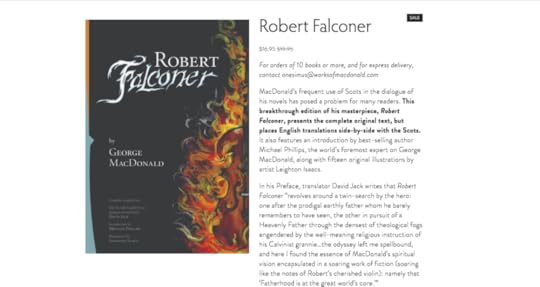
Get Robert Falconer Here!
David sent me these passages from Robert Falconer, a work which he translated (you can see the Scots on the left, and the English on the right) which deal with this question of eternal judgement, and what he sees as the love that will ultimately prevail. No matter what side you fall on eternal judgement, I love MacDonald's insights into choice and love.


Check out David's work! And buy one of his books!
and tell me... what did you think of this week's chapter?
July 18, 2018
High and Holy Feelings

High and Holy Feelings...
There is but one good; that is God. Everything else is good when it looks to Him and bad when it turns from Him. And the higher and mightier it is in the natural order, the more demoniac it will be if it rebels. It's not out of bad mice or bad fleas you make demons, but out of bad archangels. The false religion of lust is baser than the false religion of mother-love or patriotism or art: but lust is less likely to be made into a religion.
- C.S. Lewis, The Great Divorce, Chapter 11.
This chapter has one central idea...
All desires must die before they can be redeemed.According to Lewis,
There are no better and worse desires.No desires that are ultimately unfulfillable.But all desires must be allowed to die and rise again.Lewis demonstrates this for us through two unexpected characters: A mother and a lustful man.
Pam, the Mother...
Could a mother love her child too much?
In this scene we see a mother who seems to love her child deeply. However, it seems to be this very love that stands in her way toward heaven. Lewis uses this character to make a point: there are certain affections we deem completely pure— surely mother-love could never corrupt! But as Lewis demonstrates, all affections and desires can become degrading if they are not ordered properly and committed to God. They can go wrong if they are not baptized.
Of course, as we discover, it is not her love but her lack of love that prevents her from her heavenward journey. She sees Michael (her son) as a possession, something she deserves, something no one has the right to take away from her. To enter heaven, she must see that no person has a "right" to another person. Love is a gift that we give, not a noose that we tie.
According to the Spirit, Pam's son will be hers, but only after she realizes that nothing is hers by right, and everything by gift.
"He will be, Pam. Everything will be yours. God himself will be yours. But not that way.”
Pam's desire, or affection, or mother-love will be given back to her, but only if she submits it to God first.
Will she let her desire be baptized?We're left to wonder...The Lust Lizard...
We'll call him the lust lizard...
In the same way that Lewis shocks us with the idea that mother-love can be corrupting, he shocks us by showing us...
Sexual desire is good, and it can lead us to God. But if, and only, if it is baptised, directed toward God, redeemed.Lewis takes an affect (lust) we see as icky and bodily, something we'd rather not imagine in heaven, and shows that even it can become the desire that pulls us deeper into heaven, if only we'll submit it to God.
What Lewis shows us here is desire redeemed.When the man lets the angel kill the lizard, while he screams "God help me!", his desire is killed, only to rise again it's perfected form.
The desire that kept him out, is the desire that ushers him in.I love this passage...
Then I saw, between me and the nearest bush, unmistakably solid but growing every moment solider, the upper arm and the shoulder of a man. Then, brighter still and stronger, the legs and hands. The neck and golden head materialised while I watched, and if my attention had not wavered I should have seen the actual completing of a man-an immense man, naked, not much smaller than the Angel. What distracted me was the fact that at the same moment something seemed to be happening to the Lizard. At first I thought the operation had failed. So far from dying, the creature was still struggling and even growing bigger as it struggled. And as it grew it changed. Its hinder parts grew rounder. The tail, still flickering, became a tail of hair that flickered between huge and glossy buttocks. Suddenly I started back, rubbing my eyes. What stood before me was the greatest stallion I have ever seen, silvery white but with mane and tail of gold. It was smooth and shining, rippled with swells of flesh and muscle, whinneying and stamping with its hoofs. At each stamp the land shook and the trees dindled. The new-made man turned and clapped the new horse's neck. It nosed his bright body. Horse and master breathed each into the other's nostrils. The man turned from it, flung himself at the feet of the Burning One, and embraced them. When he rose I thought his face shone with tears, but it may have been only the liquid love and brightness (one cannot distinguish them in that country) which flowed from him. I had not long to think about it. In joyous haste the young man leaped upon the horse's back. Turning in his seat he waved a farewell, then nudged the stallion with his heels. They were off before I well knew what was happening. There was riding if you like! I came out as quickly as I could from among the bushes to follow them with my eyes; but already they were only like a shooting star far off on the green plain, and soon among the foothills of the mountains
There is no irredeemable desire. Isn't that a beautiful thought?
Every natural love will rise again and live forever in this country: but none will rise again
until it has been buried.
What did you think?
Join the discussion on facebook and twitter!
Reading with Joy - Twitter
Reading with Joy - Facebook
July 17, 2018
To set another Before you

The most sublime act is to set another before you.
— William Blake, The Marriage of Heaven and Hell
NOTE: for some reason, the blog deleted the text, and so I've had to attach it as an image, and it has downsized. So sorry! Just zoom in if you can't read the text. xx





Reading with Joy - Twitter
Reading with Joy - Facebook
Tune in later this week for Chapter 11!
July 11, 2018
Reading with Joy - Chapters 6-9

I'm back in Colorado, enjoying rather marvellous views...
Hello, Friends!
Whew! What a wild few weeks its been. I'm a bit behind on shownotes because I was busy turning in a section of my Phd and travelling back to the states. But I'm home now, and catching up on emails, tasks, and show notes!
In this post I have links to each new podcast (there's three!) and show notes for each one.Don't forget to join the discussion on twitter or facebook! Ask questions, make comments, and let me know what you think about the book!
Tweet me! Facebook me! Tell me what you think of the book.Twitter Discussion Page
Facebook Discussion Page
Hard-Bitten and Bowled OverChapters 6&7In these chapters we see two ghosts with opposite problems. One ghost (the ghost in a bowler hat) sees the infinite value in heaven, but he thinks he can earn it. The other (the Hard- Bitten Ghost) knows he can't earn heaven, but doesn't believe it's worth it. The Ghost in a Bowler Hat
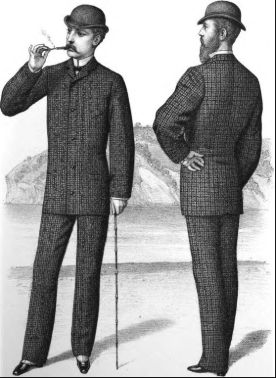
In case you were wondering what a bowler hat looks like...
The Ghost in the Bowler hat sees the infinite worth of heaven and is willing to do whatever it takes to earn it. Unlike the other ghosts who chafe and complain about the hardness of the grass, this ghost gives all that he has to get the tiniest golden apple. Look at this passage:
The amazing thing was that he succeeded. When I remembered what the leaf had felt like when I tried to lift it, I could hardly help admiring this unhappy creature when I saw him rise staggering to his feet actually holding the smallest of the apples in his hands. He was lame from his hurts, and the weight bent him double. Yet even so, inch bv inch, still availing himself of every scrap of cover, he set out on his via dolorosa to the bus, carrying his torture.
This ghost knows the value of heaven. But he doesn't know it's a gift. He thinks it's something you can buy and sell. Rather than embracing Jesus' grace, he attempts to walk his own via dolorosa (the way of the cross).
This ghost has to learn to accept heaven as God's generous gift of grace.

Grace is like the waterfall that gives life to the whole forest.
"Fool. Put it down," said a great voice suddenly. It was quite unlike any other voice I had heard so far. It was a thunderous yet liquid voice. With an appalling certainty I knew that the waterfall itself was speaking: and I saw now (though it did not cease to look like a waterfall) that it was also a bright angel who stood, like one crucified, against the rocks and poured himself perpetually down towards the forest with loud joy.
The bowler hatted ghost needs to go and be washed under the life-giving waterfall, and admit it can't attain heaven on its own.The Hard-Bitten Ghost
![Cinik [The Cynic], 1921. Oil on canvas. MG Zagreb.](https://i.gr-assets.com/images/S/compressed.photo.goodreads.com/hostedimages/1532381379i/26018733.png)
Cinik [The Cynic], 1921. Oil on canvas. MG Zagreb.
The hard-bitten ghost can't seem to see any real value in anything. He is suspicious of everything, and believes nothing. In our day, he would be quick to shout "Fake news!" One could think that he is this way because he fears that if he hopes in anything, places value in anything, he will discover it is a scam and it will disappoint him. He is a cynic and cynicism is a form of despair.
One can't help but think here of all the people who lived through WWI and WWII. Could anyone blame them for their despair?
For the Hard-Bitten Ghost to be redeemed, he must allow himself to hope and to see the beauty and value of the high country.
Discussion question: which ghost do you identify with more? the hopeless cynic? Or the enterprising opportunist? Do you struggle with despair? or being works oriented in your faith? Both?On Being SeenChapter 8Being seen and known is one of our deepest desires and our deepest fears. In this chapter we encounter a ghost who must overcome her shame to experience joy.

Gustave Courbet, Desperation, 1843
To be loved but not known is comforting but superficial. To be known and not loved is our greatest fear. But to be fully known and truly loved is, well, a lot like being loved by God.
— Timothy Keller
The biggest barrier to this ghost's entrance into heaven is her fear of being seen. Perhaps not just of being seen, but of being seen and being found inadequate, ugly, unloveable. It makes me think of the movie the Knight's Tale: "You have been weighed, you have been measured, and you have been found wanting." But, the reality is that no one can attain heaven on their own. We are all created, contingent, crumbling. To heal, we must allow ourselves to be seen, and to acknowledge our need. It's like the Spirit says...
"An hour hence and you will not care. A day hence and you will laugh at it. Don't you remember on earth-there were things too hot to touch with your finger but you could drink them all right? Shame is like that. If you will accept it-if you will drink the cup to the bottom-you will find it very nourishing: but try to do anything else with it and it scalds."Does this ghost move further into heaven? We're not sure, but we hope so. Do you think the ghost moves further into heaven? What do you tend to hide? Your ignorance? your sin? your hurt?All Who are In Hell Choose ItChapter 9In this chapter we meet Lewis' Virgil: George MacDonald. The Scotch theologian and fairy tale spinner explains shows the central question of heaven and the book: choice.

There are only two kinds of people in the end: those
who say to God, ‘Thy will be done,’ and those to whom God says, in the end, ‘Thy will be done.’ All that are in Hell, choose it. Without that self-choice there could be no Hell. No soul that seriously and constantly desires joy will ever miss it. Those who seek find. To those who knock it is opened.
— Great Divorce, Chapter Nine
MacDonald says there are ultimately only two kinds of choices: self-choice and joy-choice.
Does this seem limited? Perhaps. But what Lewis is describing here is what we discussed before: desire is meant to pull us through the world toward God, and when we misuse it, we end up not loving the world or God, but our own feelings about it. True freedom is the ability to choose rightly. Consider this quote by Thomas Merton.
"Free will is not given to us merely as a firework to be shot off into the air. There are some men who seem to think their acts are freer in proportion as they are without purpose, as if a rational purpose imposed some kind of limitation upon us. That is like saying that one is richer if her throws money out the window than if he spent it... It is for this that we account ourselves happy when we know HIs will and do it, and realize that the greatest unhappiness is to have no sense of his purposes or His designs either for ourselves or for the rest of the world."
- Thomas Merton, No Man is an Island
We are truly free when we can use our wills well. We are free when we can choose Joy instead of choosing ourselves.
What do you think of that? Does that sound like freedom to you?That's all for this week, friends! Remember you can always ask questions, make comments, and interact with others in the book club on Facebook and Twitter.
See you next week for chapters 10 and 11!June 28, 2018
Sins of the Intellect
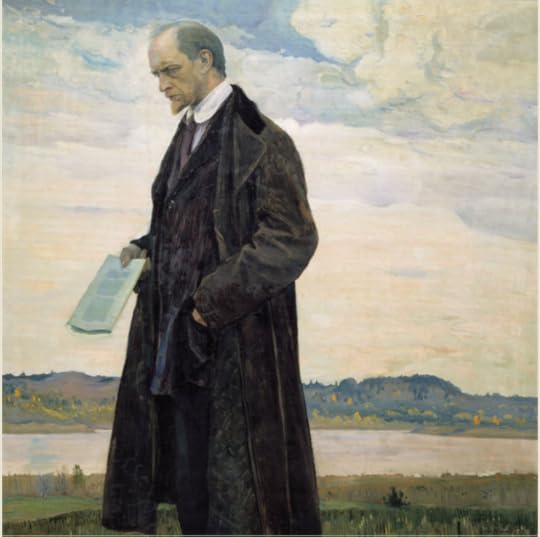
Thinker, Portrait of Ivan Ilan, 1921-1922, by Mikhail Vasilyevich
scottish accents, the incurable abstraction of the intellect, and the need to believe in something.Discussion Questions:1. What is wrong with the Episcopalian Ghost?
The ghost has lost touch with the substance of his beliefs. Throughout their conversations, the Episcopalian ghost spouts generalities, cliches, and party lines. Though he doesn't seem to believe any of it, he is hell-bent on supporting it.
Lewis seems to describe this in his essay "Myth Became Fact."
My friend Corineus has advanced the charge that none of us are in fact Christians at all. According to him historic Christianity is something so barbarous that no modern man can really believe it: the moderns who claim to do so are in fact believing a modern system of thought which retains the vocabulary of Christianity and exploits the emotions inherited from it while quietly dropping its essential doctrines. Corineus compared modern Christianity with the modern English monarchy: the forms of kingship have been retained, but the reality has been abandoned
- C.S. Lewis, Myth Became FactThe ghost is not just guilty for believing the wrong things, but for using his intellect incorrectly.
Rather than delighting in discovery, the ghost delights in the process of thinking. To go further into heaven he must learn to love Truth and Answers. Lewis writes, "There was a time when you asked questions because you wanted answers, and were glad when you had found them. Become that child again: even now."
2. What is the intellect for? How should it be used?The intellect ought to be used as a tool, which helps us understand the world and God. But it is a tool, and not an end in itself. There is a danger in over reliance on the intellect because to use it, we must set things at a distance from ourselves. Take this passage from the previously cites essay...
Human intellect is incurably abstract. Pure mathematics is the type of successful thought. Yet the only realities we experience are concrete- this pain, this pleasure, this dog, this man. While we are loving the man, bearing the pain, enjoying the pleasure, we are not intellectually apprehending Pleasure, Pain or Personality. When we begin to do so, on the other hand, the concrete realities sink to the level of mere instances or examples: we are no longer dealing with them, but with that which they exemplify. This is our dilemma—either to taste and not to know or to know and not to taste—or, more strictly, to lack one kind of knowledge because we are in an experience or to lack another kind because we are outside it. As thinkers we are cut off from what we think about; as tasting, touching, willing, loving, hating, we do not clearly understand. The more lucidly we think, the more we are cut off: the more deeply we enter into reality, the less we can think. You cannot study pleasure in the moment of the nuptial embrace, nor repentance while repenting, nor analyze the nature of humor while roaring with laughter. But when else can you really know these things? "If only my toothache would stop, I could write another chapter about pain." But once it stops, what do I know about pain?
- C.S. Lewis, Myth Became Fact
The intellect is good because it can guide you to reality, but it cannot help you confront reality. The intellect may be able to bring you to God, but it cannot help you enter into relationship. If you treat the intellect as an ends in itself, you will be cut off from the reality you see to explain.
3. What does the intellect leads us toward?I think it is meant to lead us toward relationships with others, the ability to act righteously, and ultimately, toward union with God through Christ. May we have the strength to be guided by the intellect, but never to stop short from experiencing reality. What do you think?
You answer this one in the comments on twitter and facebook, in the links below!
Facebook - Joy Clarkson
Twitter - Reading with Joy
Below, I've provided a link to the essay I referenced in the podcast.
Myth Became Fact - Lewis
NEXT WEEK: READ CHAPTERS 6 & 7.
Much love to you all!
joy
Joy Marie Clarkson's Blog
- Joy Marie Clarkson's profile
- 227 followers



